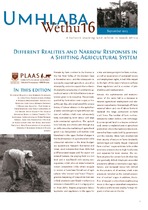| dc.contributor.author | PLAAS | |
| dc.date.accessioned | 2019-02-22T07:43:23Z | |
| dc.date.available | 2019-02-22T07:43:23Z | |
| dc.date.issued | 2013-09 | |
| dc.identifier.citation | PLAAS. (2013). Different realities and narrow responses in a shifting agricultural system: Umhlaba Wethu No. 16. Bellville Institute for Poverty, Land and Agrarian Studies, University of the Western Cape. | en_US |
| dc.identifier.uri | http://hdl.handle.net/10566/4269 | |
| dc.description.abstract | Protests by farm workers in De Doorns in the Hex River Valley of the Western Cape in November 2012 – and the subsequent responses by organised agriculture, as well as attempts by unions to support the workers –illustrate the complexities of a defective agricultural sector with little effective state attention given to its inequities. The protests, sparked by frustrations over wages as low as R69 per day, also emphasised the uneasy history of labour relations in the agricultural sector and brought to light different versions of realities, which were subsequently hotly contested by both labour and large scale commercial agriculture. The agricultural industry as a whole went through major shifts since the marketing of agricultural goods was deregulated and markets were liberalised in the 1990s. Further changes in the fiscal treatment of agriculture led to the substantial reduction in the direct budgetary expenditure. Research (Barrientos and Visser, 2012) indicates that these shifts had a differentiated impact and, for export orientated farmers, the playing field was not level and it manifested with varying consequences, which allowed some farmers to remain competitive while others struggle to survive or have been forced out of agriculture – the ‘winners’ and ‘losers’. The progressive deepening of inequalities between (white) producers and (black) workers is as intricate in these shifts as it is a legacy prior to these shifts. Despite progressive labour legislation and regulations in the 1990s for wider and stronger rights for farm workers, as well as expectations of protected tenure and employment rights, it had little impact in the light of the state’s failure to enforce these regulations and in a context of job shedding and mechanisation. | en_US |
| dc.language.iso | en | en_US |
| dc.publisher | PLAAS | en_US |
| dc.relation.ispartofseries | Umhlaba Wethu: A quarterly bulletin tracking land reform in South Africa;16 | |
| dc.subject | De Doorns | en_US |
| dc.subject | Western Cape farm worker protests | en_US |
| dc.subject | Breede River Valley | en_US |
| dc.subject | Farm workers | en_US |
| dc.subject | Farm worker strikes | en_US |
| dc.title | Different realities and narrow responses in a shifting agricultural system | en_US |
| dc.type | Other | en_US |

